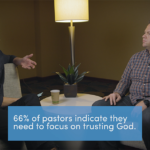
Throughout church history, Christians have believed God is sending us to the nations. At specific times, however, God sends the nations to His church.
By Micah Fries
I recently hosted a conference with the North American Mission Board on Islam and North America: Loving Our Muslim Neighbors, which coincided with the release of a B&H book of the same name.
In the book, I discuss two primary realities regarding immigration that we must consider to better understand the future of Islam and engage Muslims in North America.
1. Immigration will necessitate relationships between Christians and Muslims.
In an increasingly pluralistic society, Christians have three possible options. We can ignore the increasing pluralism. We can work to reverse the pluralism. Or we can build growing numbers of relationships with those who disagree with us.
I would contend that the growing number of diverse religious beliefs and worldviews is an indication of how God is moving, bringing the world to us. I concur with Ed Stetzer and his thoughts about migration and gospel opportunity.
Immigration puts a face on those we are called to reach, which makes evangelism more complicated. And as it turns out, many non-Christians—particularly devout people of other religions—are pretty nice once you get to know them!
They are not “people over there living in darkness,” but they are our neighbors living in our community. Immigration becomes an evangelistic opportunity when it gives us a love for immigrants as human beings (without caricature) and teaches us to have compassion for them (including their spiritual condition), as we would for anyone in need of the gospel.
The emerging cultural changes taking place around immigration cause social and cultural challenges. The messiness of relationships is worth it, though. The church is called to recognize its evangelistic responsibility and opportunity in the midst of these changes.
I do not fear growing numbers of people who are different from me, and you should not either. Instead, let us view this as a unique, historical moment that we can steward for God’s glory and the common good.
2. Immigration will open doors for gospel engagement among Muslim communities.
One of the unintended consequences of immigration is the increased willingness of immigrant communities to consider new and otherwise unwelcome ideologies. This can help pave the way for the introduction of the gospel. Mark Russell and Daniel Ryumugabe discuss this in an article that was originally published in the Lausanne World Pulse.
In Ted Lewellen’s work, The Anthropology of Globalization, he points out that migrating people often develop a new identity—or at the least have their previous identity significantly altered.
Moreover, the current trends of migration have largely eliminated the historical dichotomies (such as rural/urban) and have produced the need to look at things in a more fluid way. Social networks can be borderless due to increases in efficiency and decreases in the cost of transportation and communication technologies.
The world is changing and so is the face of migration. This increased fluidity and the psychological adjustments that occur in immigrant communities present an open door for gospel engagement by mission-minded Christians. Your Muslim neighbor is not someone to be feared.
Instead, recognize the upheaval that person has recently experienced in his or her life, recognize the person’s fear and lack of cultural awareness, and understand that new neighbors such as yours are willing to listen to you share with them about how you’ve found hope.
If we want to be more evangelistic and see greater numbers of people making commitments to Christ, our Muslim immigrant neighbors may be just the community in which this hope is realized.
We must realize that in an increasingly pluralistic society, with growing numbers of Muslims as our neighbors, local churches are faced with the opportunity to engage their neighbors with the gospel or to eventually die. There are likely no other alternatives.
As Christians, and more specifically as church leaders, we must provide lenses through which our churches view the world. If we desire to see God use His church to engage these transient communities, we must teach our people how to see the world the way Jesus sees it.
We must teach our congregations how to leverage their theology in order to engage in missionary encounters with their neighbors who have a worldview different from their own.
For the entire history of the church, Christians have believed that God is sending us to the nations. At specific times in history, however, God sends the nations to His church. This appears to be one of those moments in history. Let us not miss it.
Let us embrace what I believe is a divine and transformative moment, and let us confidently declare and display the gospel of Jesus among our Muslim neighbors for God’s glory and for their good.

Micah Fries
Micah is the Director of Engagement at Glocal.net and the Director of Programs at the Multi-Faith Neighbor’s Network. He has served as a pastor in the United States and as a Christian minister in Burkina Faso, West Africa.












